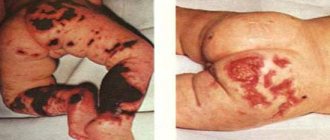Pathologies of the brain and central nervous system significantly reduce a person’s quality of life and lead to severe disorders. Among the diseases of this group, disorders of the congenital type or those that develop in the first years of life are especially serious. They are accompanied by developmental delays and affect human health in the future. Such pathological processes include West Syndrome.
Vivantes clinics only diagnose this disease in children.
At the Vivantes clinics, diagnosis and treatment of West Syndrome in Germany are carried out by doctors of the highest category. Our clinic’s specialists perform early diagnosis of the disease using modern expert-class equipment in their practice.
Treatment of the disease is carried out according to innovative methods, it includes mainly conservative therapy, but if there are appropriate indications, surgical interventions of varying degrees of complexity are performed.
What is West Syndrome
In neurology, West syndrome is a pathological process of a non-inflammatory nature that affects the structures of the brain. This disease is characterized as infantile epileptic encephalopathy. Its main distinguishing feature is spastic muscle contractions, similar to epileptic seizures.
develops especially often in children in the first years of life. According to statistics, the manifestation of the disease occurs in the first year of a child’s life in approximately 90% of cases. In the remaining 10% of cases, the first signs of the disease appear before 4 years of age. But at the same time, in the vast majority of children, spastic spasms disappear by the age of 3, after which they transform into various forms of epilepsy.
West syndrome belongs to a group of rare neurological disorders. According to statistics, the disease accounts for about 2% of all cases of epilepsy. However, if we talk about infantile forms of epilepsy and epileptic encephalopathies, among them West syndrome accounts for about a quarter of all cases.
The causes of the development of West Syndrome in children are quite numerous, of which the most common in neurology are considered to be:
- consequences of intrauterine infections;
- fetal hypoxia at various stages of intrauterine development;
- premature birth;
- intracranial injuries received during labor;
- respiratory problems in an infant;
- some forms of abnormalities in the structure of the brain.
It is also important to understand that in approximately 13% of cases the true cause of West Syndrome in infants remains unknown.
Symptoms
Among the symptoms of this disease are:
- Frequent seizures of an epileptic nature. It is quite difficult to cure them.
- Changes in the EEG characteristic of this disease (hypsarrhythmia).
- Distinct disturbances in psychomotor development.
Almost all children with West syndrome (90%) begin to experience symptoms almost immediately after birth (4 to 8 months). Seizures are characterized by a short duration, so it is not immediately possible to make a correct diagnosis.
West syndrome is considered a serious disease that threatens the patient's life. It is also called infantile spasms.
The attack always occurs in the same way: the child’s whole body leans sharply forward, and the head bends strongly. Such spasms usually occur when the baby wakes up or while falling asleep. In this case, there can be from ten to hundreds of attacks in one day.
Often during attacks the child may lose consciousness. Because of them, infants experience delays in the development of psychomotor skills. Children with West syndrome react poorly to the environment and have virtually no contact with relatives.
First signs
The first sign of an attack of West syndrome is a child's strong crying, so doctors often diagnose such babies with colic. The standard signs of this disease include:
- Strong bending of the entire body forward.
- Generalized convulsions in the lower and upper extremities, throughout the torso.
- The limbs involuntarily spread apart.
Usually such an attack lasts no more than one or two seconds. There is a short pause and the attack resumes again. In some cases, spasms are isolated, but most often they occur in succession.
Children with West syndrome are often very irritable and have developmental delays of varying degrees of severity. Infants with these diseases often behave like they are blind.
Symptoms and diagnosis of West Syndrome
As mentioned earlier, in most cases the pathological process debuts in the first year of a child’s life. At the same time, the clinical picture becomes more diverse as West Syndrome develops , and the progression of the pathology begins mainly with a delay in psychomotor development. Among the most characteristic clinical signs, experts include:
- loss of the infant’s grasping reflex;
- disorders of fixation, gaze focusing;
- the child cannot follow a specific object with his eyes;
- generalized epileptic seizures of varying duration.
It is important to understand that intervals between spastic muscle contractions can be less than 1 minute. Moreover, the frequency of seizures varies significantly, from several dozen per day to hundreds. In this case, the head bends and twitches, the arms are extended, the body bends into an arc (the attack ends with complete relaxation of the body).
During the diagnostic process, our doctors pay special attention to the symptoms of West Syndrome , record every parental complaint, and find out the frequency, frequency, and nature of attacks. A detailed examination of the medical history, examination of the child is also carried out, and the specifics of psychomotor developmental delay are assessed. After this, a series of laboratory and hardware tests are carried out:
- general clinical blood and urine tests;
- biochemical blood test;
- electroencephalography;
- polysomnography;
- computed tomography or magnetic resonance imaging of the brain.
A mandatory stage of diagnosis is consultation with specialized specialists, including a pediatrician, pediatric neurologist, and epileptologist.
Diagnosis and causes of cryptogenic epilepsy
It is difficult to accurately determine the causes of this type of epilepsy. However, the doctor, studying outpatient records and conducting a detailed survey, finds out the presence of:
- Fetal hypoxia;
- Presence of intrauterine infection;
- Injuries during childbirth.
An accurate and detailed description of the manifestations of the attack itself plays an important role in diagnosis. Parents should pay close attention, as a preschool child may not always be able to confidently describe his feelings. If parents notice any deviations in the child’s behavior, they should definitely visit a doctor. A pediatrician or neurologist should indicate what you should pay special attention to. The difficulty is presented by absence seizures (non-convulsive seizures), in which the child freezes for several seconds.
EEG (electroencephalogram) and MRI (magnetic resonance imaging) are used to diagnose cryptogenic epilepsy. The EEG can record typical convulsive activity, which is inherent in generalized seizures. In order to confirm the presence of seizures in a child, overnight video-EEG monitoring is required. This technique is expensive and is carried out only in specialized medical centers. It allows you to confirm or refute the disease with complete accuracy.
Using a hammer instrument, mild paralysis and signs of incoordination can be detected. Structural defects in the brain can be detected using MRI. CT (computed tomography) in this case is not very informative.
Conservative
As part of conservative therapy, our specialists use innovative techniques, use the latest generation drugs, the duration of administration and dosage of which are calculated individually. The main groups of drugs aimed at treating West epilepsy syndrome include:
- muscle relaxants;
- glucocorticosteroids;
- valproate group agents;
- adrenocorticotropic hormone;
- vitamins of group B6;
- immunomodulators.
Surgical
Surgical interventions in the treatment of West Syndrome occur in rare cases when attacks are caused, for example, by a brain tumor or tuberous sclerosis. In such cases, surgeons of the highest category are involved, who perform operations to remove lesions and tumor processes. The maximum accuracy and efficiency of neurosurgical methods is due to both the qualifications of doctors and the use of the latest equipment, for example, the Da-Vinci robotic system.
Treatment
Given the continuous progression of symptoms, especially in the psychomotor area, treatment should be prescribed as early as possible.
The drugs of choice in the treatment of West syndrome are adrenocorticotropic hormone (ACTH) and valproic acid derivatives (valproates). If ACTH is ineffective, it is possible to prescribe glucocorticosteroids (GCS), for example, prednisolone, dexamethasone; Benzodiazepines (nitrazepam, clonazepam), vigabatrin, immunoglobulins (for example, Octagam), and in some cases high doses of pyridoxal phosphate (vitamin B6) are also effective in treating the disease. Hormonal therapy is prescribed in combination with basic antiepileptic drugs. Treatment should be carried out under the supervision of a neurologist, and when using hormonal drugs, in a hospital setting. In addition, constant monitoring of the state of metabolic processes in the body and EEG control is necessary. When prescribing symptomatic therapy, drugs with stimulant effects that reduce the threshold of convulsive brain activity should be avoided. At the same time, the use of drugs in treatment that improve metabolic processes in brain tissue helps eliminate seizures and has a positive effect on the mental development of children. If the child has an organic substrate (for example, tuberous sclerosis, tumor), the issue of surgical treatment is decided. This treatment method is associated with serious risks to the life and health of the child, which limits its use to strict indications.
It is important to pay attention to the correction of delayed psychomotor development in children, which, even with successful relief of convulsive syndrome, is often sustainable. It is necessary to conduct explanatory conversations with the children’s relatives and teach them the rules of caring for children with this pathology. Only an integrated approach to treatment allows us to hope for achieving clinically and prognostically significant results.
Prof. Dr. Bettina Schmitz
Neurology – Epilepsy
Head of the Department of Neurology
Specialization
- Epilepsy
- Differential diagnosis of non-epileptic paroxysms
- Long-term EEG - video monitoring
- Medical and non-medical care for paroxysms and complications associated with epilepsy
- Member of the British Medical Association
- Instructor and member of the European Academy for the Study of Epilepsy (EUREPA)
- Member of the Commission on Psychobiology and the International League Against Epilepsy (ILAE)
- Psychoorganic syndrome, World Federation of Societies of Biological Psychiatry (WFSBP)
- Video consultation
Show doctor's personal profile
Prof. Dr. Jörg Müller
Neurology – Parkinson's, MS
Head of the Department of Neurology
Specialization
- Recognized international expert in Parkinson's disease, dystonia and tremor
- Neuromuscular diseases
- Multiple sclerosis
- Treatment using butolotoxin (dystonia, spasticity)
- Deep brain stimulation treatment
- Author of more than 70 scientific publications, is a member of international expert councils
Show doctor's personal profile
Forecast
Is a complete cure possible? The prognosis for recovery depends on how timely and adequate the prescribed treatment was. So, if the child received help in the first weeks after the onset of signs of illness, the chance of recovery (long-term remission) is very high.
However, motor impairment and intellectual retardation may persist for a long period of time.
If you delay treatment, the disease will progress, and over time there is a high risk of relapses.
(
1 ratings, average: 5.00 out of 5)
Prof. Dr. Bruno-Marcel Mackert
Neurology
Head of the Department of Neurology
Specialization
- Internationally recognized specialist in stroke, peripheral nervous system diseases and clinical electrophysiology
- Author of over 40 original publications
- Board of Directors of the Berlin Stroke Society (BSA)
- Member of the Board of Directors of the Berlin Center for Stroke Research (CSB)
Show doctor's personal profile
Prof. Dr. Jörg Wissel, MD, FRCP
Neurological rehabilitation
Head of the Department of Neurological Rehabilitation and Physiotherapy, Department of Neurology and Rehabilitation Center
Specialization
- Neurological rehabilitation after stroke, traumatic brain injury and spinal cord injury
- Rehabilitation therapy for Parkinson's disease and dystonia
- Botulinum therapy
- Treatment of spasticity
- Neurological rehabilitation using intrathecal baclofen therapy and deep brain stimulation
- Author of more than 90 scientific publications, member of several expert commissions
Show doctor's personal profile










